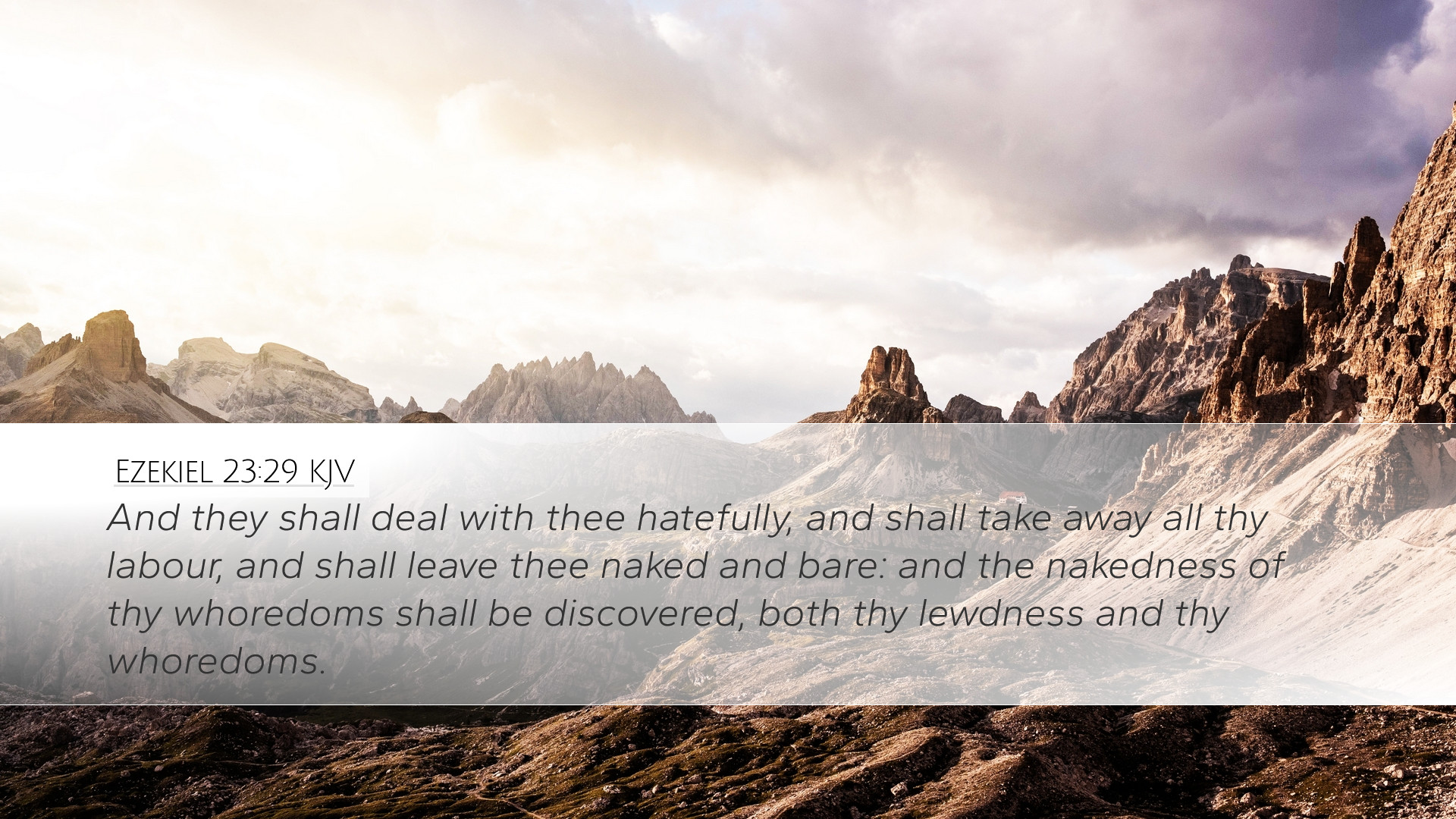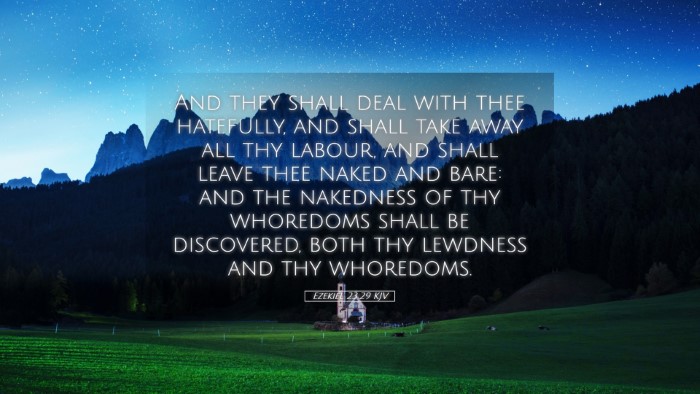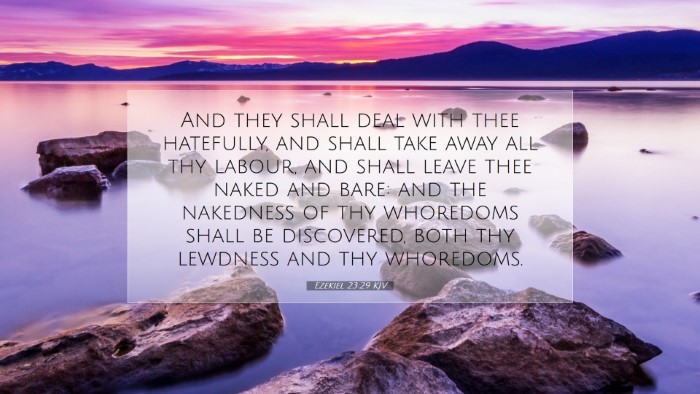Commentary on Ezekiel 23:29
Ezekiel 23:29 reads: "And they shall deal with thee hatefully, and shall take away all thy labour, and shall leave thee naked and bare: and the nakedness of thy whoredoms shall be discovered, both thy lewdness and thy whoredoms." This verse is a part of a larger allegorical narrative where God addresses the unfaithfulness of His people, using the analogies of two sisters - Oholah and Oholibah - to represent Samaria and Jerusalem respectively.
General Context and Historical Background
The Book of Ezekiel is set during a tumultuous period of Israel's history, specifically during the Babylonian captivity. Ezekiel, a prophet among the exiles, uses vivid imagery and allegories to communicate God's message of judgment and restoration. The chapter emphasizes the consequences of spiritual infidelity, showcasing how Israel's pursuit of foreign alliances and idolatries led to their downfall.
Verse Breakdown
This verse highlights the consequences of betrayal and promiscuity in a spiritual sense. The mention of being dealt with hatefully underscores the emotional and relational consequences of turning away from God:
- “They shall deal with thee hatefully”: This part illustrates the inevitable reaction of those who forsake God. It reflects both the internal turmoil and the external hostility that arise from spiritual unfaithfulness.
- “Take away all thy labour”: Here, the text suggests that the efforts and fruits of their labor will be stripped away. This can be interpreted as divine judgment, leading to a loss of blessings and prosperity that once came from God's favor.
- “Leave thee naked and bare”: The imagery of nakedness signifies shame and exposure. It emphasizes the vulnerability that comes with sin, where one's true state is revealed. This is not merely physical nakedness but a spiritual and moral implication of being stripped of righteousness.
- “Nakedness of thy whoredoms”: This phrase exposes the true nature of Israel’s sinfulness, indicating that their infidelity is not just unfaithfulness to treaties but a betrayal of their covenant with God.
Theological Implications
This verse serves as a sober reminder for believers of the consequences of spiritual infidelity. Theologically, it underscores several critical themes:
- The holiness of God: God's nature requires justice and righteousness. Spiritual infidelity cannot go unpunished, pointing to His character as a God who desires loyalty.
- Divine Judgment: The repercussions described reflect the divine judgment that comes upon those who reject God's ways. It serves to remind the faithful of the seriousness of sin.
- Hope for Restoration: Though the immediate context is one of judgment, the broader narrative within Ezekiel culminates in themes of hope and restoration, suggesting that despite judgment, God’s desire is for redemption.
Insights from Public Domain Commentaries
Various commentaries provide insights into the text that enhance our understanding:
- Matthew Henry: Henry emphasizes the starkness of the imagery, noting how it vividly portrays the disgrace that comes from abandoning God. He reflects on the societal implications of sin and warns against the allure of worldly desires that can lead to spiritual demise.
- Albert Barnes: Barnes focuses on the metaphorical significance of Oholah and Oholibah's actions, connecting them to the idolatry of the Israelites. He illustrates how their decisions led to dire consequences, emphasizing the principle that turning away from God invites disdain and hardship.
- Adam Clarke: Clarke elaborates on the figurative language used in the verse. He stresses the importance of fidelity in spiritual matters, explaining how the people of Israel are characterized by their unfaithfulness. His commentary highlights that God’s warning is meant to evoke repentance and draw the people back to His covenant.
Practical Applications for Modern Believers
For pastors, students, theologians, and Bible scholars, applying the insights from Ezekiel 23:29 can be transformative:
- Examine personal fidelity: Encourage a self-examination of how one's life aligns with God’s commands, calling for a sincere commitment rather than mere religious observance.
- Teach the seriousness of sin: Use this scripture to communicate the gravity of moral and spiritual failure, guiding congregations to understand the long-term effects of turning away from God.
- Cultivate a culture of accountability: Foster community relationships that hold one another accountable in faithfulness, encouraging support systems that point back to God’s Word.
Conclusion
Ezekiel 23:29 ultimately serves as both a warning and a call to faithfulness. The profound truths found within offer a reflective lens through which modern believers can assess their relationship with God. The exploration of the verse through historical context, theological implications, and practical applications can enrich the understanding of the severity of spiritual unfaithfulness and the relentless grace of God, who longs for the return of His people.


